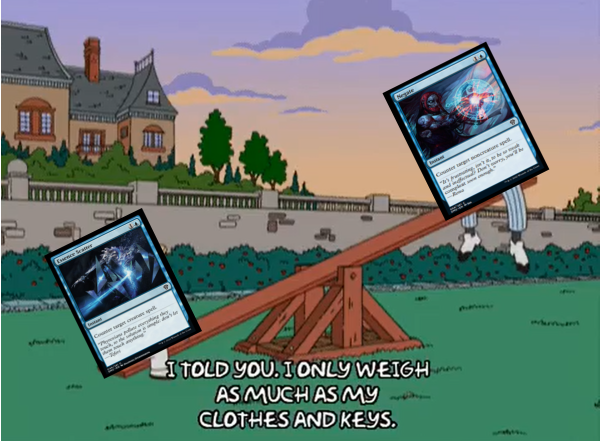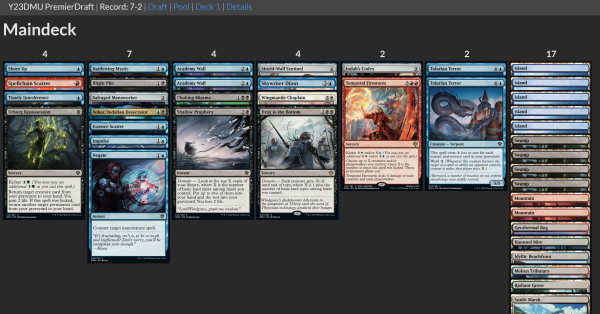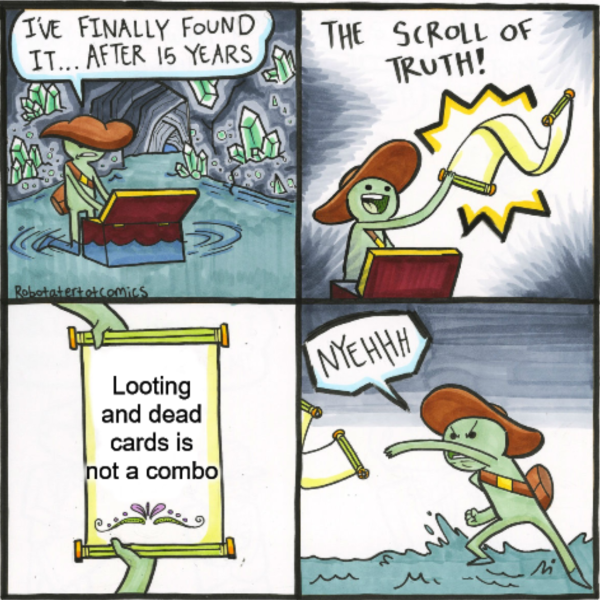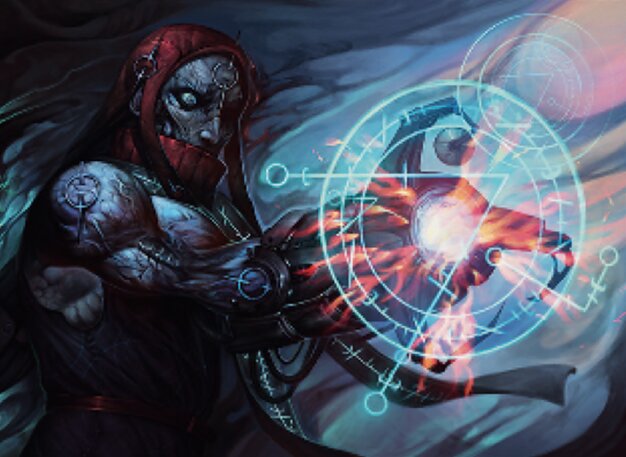Are you a Quiet Speculation member?
If not, now is a perfect time to join up! Our powerful tools, breaking-news analysis, and exclusive Discord channel will make sure you stay up to date and ahead of the curve.
Magic is full of situational cards, and in Limited, we usually want to avoid them. We want to fill our decks with reliable cards to enact a consistent game plan. However, there are exceptions to this rule. Sometimes we build our decks in such a way as to optimize certain effects. Heroic Charge isn't good on most board states, but if we build our deck to go wide, we get a lot of value from it. Sometimes the format dictates the importance of a fringe card. For instance, Fade into Antiquity was an excellent answer to the powerful sagas in Kamigawa Neon Dynasty.
Negate appears frequently in Magic: the Gathering sets. Usually, we ignore it. In some situations though, it is the best card we can have. It's a nice trick to have access to in the sideboard for when our opponents have a non-creature bomb for which we have zero outs. There are formats where the card thrives, and more importantly, there are decks in an array of formats that actively want it. What sort of decks are those? This week, we'll be doing a deep dive, examining when we want this situational counterspell.
Aggressive Decks Do Not Want Negate
This might be an obvious one to some, but it bears repeating:
Aggressive decks do not want Negate.
What aggressive decks do want, is to set the pace with creatures. They want cards that push damage. While protecting a creature may be tempting, forcing yourself to leave two mana up slows down your offensive assault. A card like Shore Up on the other hand, is a far more valuable tool in these decks. Also, if you're worried about running out of creatures, might I recommend using that slot on another creature?
While we might consider boarding in a Negate against a powerful effect like Wrath of God, we should never start one in the main.
Essence Scatter Is Not an Apt Comparison

Creatures are the currency of Limited games. They trade off, force damage, pressure opponents, and defend your life total. As a result, removal goes early, and Disenchants are relegated to sideboards. Your opponent will always have creatures in their deck and a couple will be very good. Being able to answer a threat, on the stack, for two mana, is a powerful and reliable play. As a result, Essence Scatter is almost always a premium common. Negate will rarely be as desirable of an option.
Negate Doesn't Work If You Can't Answer Creatures
Negate has a lot of good targets in Dominaria United (DMU). Urborg Repossession and Phyrexian Espionage are cards that threaten to win a value game and control decks are often vulnerable on this axis. However, if we counter the Divination, but still take six damage from creatures on board, we're not really getting ahead.
Negate helps us on the stack, but like all counters, if we're losing the game on the battlefield, the counter doesn't matter. The best homes for Negate can manage the board, be it with their own creatures or removal spells.
Control Decks Are the Best Homes for Negate

This Domain deck is very good at answering creatures and generating value. Once we have those two bases covered, Negate becomes a card we actively want. A deck like this is designed to stabilize and grind out a win. However, there are threats to our stable board. Maybe it's a Heroic Charge or a Lightning Strike to the face or just a combat trick for lethal.
Once we get to a stable board, the card we most want to draw is Negate. However, it can also help us get to the board states we want. Countering a removal spell can keep our blockers safe and provide more options down the road. Formats like War of the Spark have non-creature threats we need to answer. Negate has extra versatility in formats like that.
Managing Situational Spell Count
Earlier we commented on the downside of situational spells. These cards are a luxury to include in our deck and we can rarely afford too many of them. In some formats, we might want a Shatter, some graveyard interaction, or even a Broken Wings variant. What we don't want is all three. When our deck has too many situational cards, we have less reliable action. There will be too many situations where we can't do anything. In other situations, we'll lose agency because we're forced to just cast these spells on any legitimate target.
However, our decks can be built to minimize the downside of these situational spells. The more card draw we have, the lesser the downside of a "dead card". If our hand is full of gas, and one card is situational, we have the luxury of waiting for that situation.
Additionally, cards like Thrill of Possibility become more interesting when we know we have a card that might be a dud in certain match-ups. Usually, we want to save the counter, but if we can't afford to hold it, we have to take action.

Threats at Common
I've heard new players justify a maindeck Negate with the assumption that "it will probably hit something". They're probably right. Holding a spell and waiting for a valid target to turn it on though, has a real cost. First of all, timing matters in Magic. We want to use our mana every turn and play our early-game spells in the early game. Proactive spells help us set up our game plan. Reactive spells need something to react to. Because so many game plans are built on synergy. If your opponent enacts their game plan, it theoretically makes the cards in their deck better. If we're waiting to use our cards, we're falling behind.
To evaluate this counter, there needs to be a high likelihood that it will interfere with our opponent's game plan. In DMU, there are some juicy targets.
The Juicy Targets
These cards are all common and represent the endgame for the format's pillars. At uncommon the power level rises, including a number of powerful kicker spells, some devastating sagas, and removal spells. All can be answered cleanly by a well-timed Negate.
End Step
In DMU we should look to include a Negate when we know what it is doing for our deck, and when we can afford to do so. UB Spells decks and Big Domain decks, for example, will want it if they can reliably cast it. As long as we're playing a slower strategy, are capable of generating value, and are good at dealing with creatures, Negate can be a good situational card that outshines expectations.




